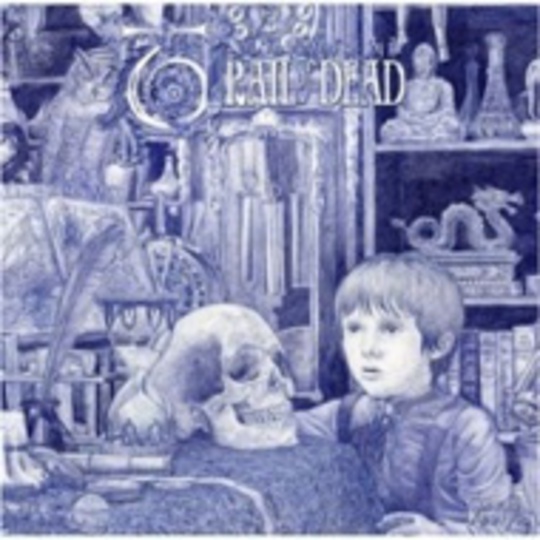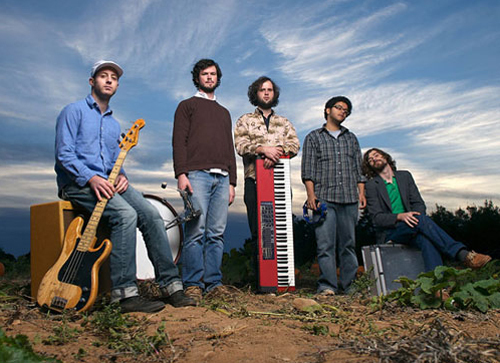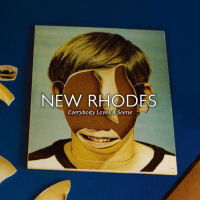It's difficult to know what to say about this, the sixth pouring forth of ideas from the best fuckin' band in Texas, and how to say it accurately and fairly. The first listen to The Century of Self brings nothing but acute disappointment. We are, let's recall, listening to the band who wrote the 'fuck you, world' that was Madonna, the almost universally lauded Source Tags & Codes and the heinously derided and actually completely magnificent Worlds Apart.
We'll sidestep So Divided for now.
Actually, maybe that's the problem. Is there another band out there at ...And You Will Know Us By the Trail of Dead's level, who we so WANT to succeed, despite the numerous bumps in the road and occasional fuck-ups? This band have so much material, so much of it joyously, furiously brilliant, that it's really easy to ignore the stuff we don't like so much. The Century of Self might make us a bit uneasy at first, 'til we shrug and reassure ourselves, 'The next one will be better', and clutch it to our hearts anyway. Then again, maybe it's like an optical illusion - a mass of dots, slowly giving way to a clear picture. Perhaps TOD have achieved something surprising in making a record you can entirely choose to love or not.
The sound they have carved out is dependent less on killer hooks (plentiful though they are), and more on the sonic language they have designed. The crashing, pealing chords, the twin drumkits and hammered bass and floor toms, the voices in unison, and the crescendos that each song explodes into - these are all part of TOD's own personal iconography, and we the listeners now expect to hear it all played out before us, adorning new ideas and choruses. We expect each of these songs to be the song we clutch each other to messily in front of stages in every city we see them in, and we really - REALLY - want to love each one. We love TOD, and maybe we expect too much.
The reaction, then, is part relief at the familiarity of this intricate, dense and really fucking proggy record, and part disappointment, because so far these songs aren't as loveable as the old ones. 'Halcyon Days' is overwrought, and overburdened with instruments, but it's also majestically bipolar, pinging between bellowing collective intent and subtle touches of beauty - elegant pianos and yearning vocals softening the core of the song before it leaps back into life. 'Fields of Coal' is at once the least adventurous and most likeable thing here, wrapped in the familiarity of guitars that sound like church bells, an all-for-one-and-one-for-all chorus, and the the kind of hymnal melody that reminds you of what the word 'anthemic' actually means. The only song that really feels like the TOD that we fully claim for our own, is 'Isis Unveiled'. Comfortingly, it sounds like Judgement Day, with an intro that - swear to God - sounds like the four horsemen of the apocalypse, pounding at the sinful head of the penitent and pitiable listener. Conrad Keely's vocals stride across the song with kingly arrogance, and it's all going really well indeed. And then it slows down, and the instruments plod and stomp in unison, the tension slackens, and the moment is gone. It kicks in again from the start, but it's just not fun anymore, and it feels like a strategic error, an attempt to regain lost territory, rather than the call to arms it sounded like five minutes ago.
The other issue, unbelievably, is the record's noisiness. The guitars and keyboards and many, many drums crash and bang and stab, and the legion of voices chant and roar and do their best to project the image of fists punching the air. But the noise doesn't punctuate, it fills. The result isn't blinding or deafening, merely a dulling of the senses. Where this band often use noise to express extreme malevolence, disgust and/or a sense of intellectual superiority, here it frequently tends towards the somewhat less expressive territory of 'loud bits'.
No other band could legitimately produce this record without being accused of extreme plagiarism, and perhaps that goes some way to explaining why, despite its shortcomings, it is still likeable. Or perhaps that just demonstrates how hard - for this writer at least - it is to be objective about this band, once under their spell. Everything here reassures the devoted fan of three facts; that - public opinion be damned - this band still believe they're the best fucking band in the world; that every song on this record will sound deliriously good live; that they're here to stay. This isn't the sound of a band winding down or running out of ideas; just the sound of a band in need of some focus. TOD have always been heavily prone to grandioseness. It's a necessary part of their charm, but not unlike the overwrought calligraphy that adorns much of their artwork, the flourishes have begun to obscure the words, and it's hard to know what they want to tell us this time round. For this most articulate of bands, it's a problem.
-
6Gen Williams's Score






















